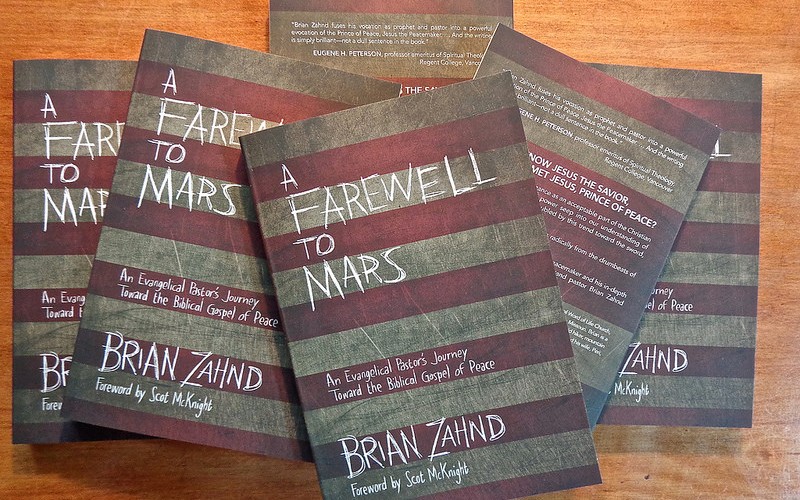A Farewell to Mars
Recently I finished the book A Farewell to Mars by Brian Zahnd. This book serves as a great connector between two other books I love, Boyd’s Myth of a Christian Nation and York’s A Faith Not Worth Fighting For. Zahnd breaks down our need and dependance upon violence, especially the subconscious hold it has over us. This is a tough sell for Christians in America as I’ve personally experienced in the process of changing my own views on this the last couple of years. However, I believe this conversation to be at the heart of where the Church will move in the future as we learn to distinguish between our allegiance to a nation and our allegiance to God’s Kingdom.
Our responsibility is not to chaplain the state but to call the state to repentance and to surrender to the King who is Lord. …while we believe in Jesus as Savior of the private soul, we remain largely unconvinced about his ideas for saving the world. The resurrection is not only God’s vindication of his Son; it is the vindication of all Jesus taught. Easter Sunday is nothing less than the triumph of the peaceable kingdom of Christ. Easter changes everything. The peacemaker stands against the crowd. The peacemaker is the one who tries to create space for mercy and truth. Sadly, this is why so many of the great peacemakers of history have ended up as martyrs—from Jesus to Gandhi to Martin Luther King Jr. The Passover crowd shouted, “Hosanna!†(“Save now!â€) until it realized that Jesus wouldn’t save them by killing their enemies; then it shouted, “Crucify him!†Jesus loves you, but he may not love the crowd you have aligned yourself with. To follow Jesus requires the courage to leave the crowd and join his little flock, one not driven by the demonic spirit of fear. Jesus says to a humanity that has built its civilizations upon the blood of sacrificial victims, “I forgive you, but we’re not going to play this way anymore.†No more cruelty. No more blame. No more scapegoating. No more sacrificing. No more trying to shape the world by the violent sacrifice of collective murder. Jesus is the Lamb of God who ends sacrifice! The cross is shock therapy for a world addicted to solving its problems through violence. The cross shocks us into the devastating realization that our system of violence murdered God! The truth that Jesus was trying to show the nationalistic crowd of Judean disciples is that freedom attained and maintained by killing is another name for slavery! Let that sink in. What they think makes them free actually enslaves them. They are slaves to their practice of collective killing for the sake of power and they self-deceptively call it freedom. For the crowd, freedom was just another word for killing. For Jesus, freedom was another word for love. Violence in the name of freedom always circles back to hell. Jesus is the way out. In the midst of our sanctioned practice of collective killing done in the name of freedom, Jesus comes and speaks the truth that will set us free. Or as Jesus said, “If the Son makes you free, you will be free indeed†(John 8:36). Do we Christians secretly wish that Jesus were more like Muhammad? It’s not an idle question. The moment the church took to the Crusades in order to fight Muslims, it had already surrendered its vision of Jesus to the model of Muhammad. Muhammad may have thought freedom could be found at the end of a sword, but Jesus never did. So are Christians who most enthusiastically support US-led wars against Muslim nations actually trying to turn Jesus into some version of Muhammad? Jesus said that something has hidden the peaceful way from our eyes … and more often than not, it’s a flag. If patriotism simply means the pride of place that inspires civic responsibility, so be it. But if patriotism means “my country right or wrong,†it’s a kind of groupthink blindness that hides the things that make for peace. Empires produce a pseudo-peace—a Pax Romana—but it is a peace that inevitably leads to war. Imperial dominance of a superpower nation over lesser nations incites resentment and retaliation leading to violence and war. War, as a legitimate means of shaping the world, died with Christ on Good Friday. Jesus refuted the war option when he told Peter to put up his sword. Killing in order to liberate Jesus and his followers from the violent injustice of Caiaphas, Herod, and Pilate would have been a just war—but Jesus refused to engage in a just war. He chose instead to bear witness to the truth, forgive, and die. Jesus took the death of a world framed by war into his body and he and it both died together. Jesus was buried and with him was buried the old world devoted to sin and death. On the third day Jesus was raised and a new world was born. Of course the old world of death still lingers around us, but in the midst of it, the world to come is being born.
Do You Want to Read the Bible Without Falling Behind?
Sign up your email and I’ll send you a PDF to download and use my custom-made reading plan system. There’s no way to fall behind on this system and every day will be different no matter how long you use it!
I’ll send future content directly to your inbox AND you can dive into the Bible like never before.





